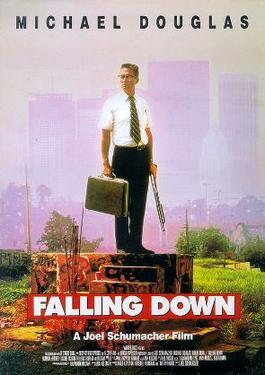Steven H. VanderLeest's Blog, page 2
April 2, 2021
Technology and the Deadly Sin of Sloth: Part 2
Aesop’s fable of an animal race with an unexpected winner illustrates the virtue of methodical diligence on the part of the tortoise and warns of the dangers of the hare’s overconfidence leading him to sleep on the job. In Part One we defined sloth, the sin of laziness, and explored how we might define work. In this second part, we explore the difference between sloth and rest, examine how technology might make us lazy, and end with a look at technological diligence.
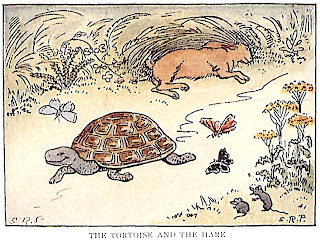
The modern workaholic world does not like rest:
We will not rest until we succeedYou need to give 110%No rest for the wearyThere seems to be no room for anything besides our work. The corporate world expects us to work long and hard for our pay. Ironically, often such work is in service to a master who derives a monetary benefit from our labor, providing the master a life of leisure. The worker also deserves rest, for rest has a purpose.
The Purpose of RestScripture tells us to work, but it also tells us to rest. God sets the rhythm of work and rest in the creation story, laboring for six days and resting on the seventh. But surely an omnipotent God did not need physical relief from heavy exertion, so then it seems that rest serves a broader goal. Theologian Dietrich Bonhoeffer went so far as to identify the seventh day of Sabbath as “the meaning and goal of the week and its toil.” (Life Together, p 68)
God recognized our creaturely need for rest, relaxation, and rejuvenation, ordaining a cycle of work and rest in the Sabbath day and in the year of Jubilee. Taking a breather, stopping for a break, taking a vacation -- these are all legitimate forms of self-care that do not constitute sloth. Resting after labor provides the opportunity to look back and take satisfaction from our work. Rest is necessary for rejuvenation, for re-creation of ourselves to restore health and energy. This kind of rest may take the form of sleeping or relaxing repose.
Another kind of rest does not appear to be rest at all at first glance. Our leisure time can also take the form of play or self-improvement, whether by active exercise or intellectual pursuits. This kind of rest can appear to be hard work, but it still serves a restorative purpose.
Rest is also necessary in order to worship. “Be still and know that I am God.” (Psalm 46:10) Worship may look like rest to the outside observer, but it is also active dialog with God. We might be in prayer, or quietly reading and meditating on his word. These are all appropriate forms of rest that are not sinful sloth.
Since all these forms of rest are warranted and even ordained by our creator, then lack of activity, by itself, cannot be the sin of sloth. Sloth is not equivalent to rest. Rest is always balanced with work. When we avoid legitimate work our rest becomes illegitimate. Taking a permanent break is no longer rest -- it is sloth. Consider two examples: winning the lottery and taking retirement.
Any “get rich quick” scheme is a shortcut that should signal laziness. On the day that I passed my doctoral defense after several grueling years of hard work and research, on a whim I bought a lottery ticket for the first (and last) time in my life. That evening I watched the numbers pop up on little ping-pong balls that dropped into the slots. When two of my numbers matched in the first three drops, my heart raced a bit -- I only needed three numbers to win a little prize and five numbers would make me rich! Yet no more matched. My disappointment lasted only a moment and then the impulse to go buy another ticket hit me strongly. I was so close; the next ticket would surely be a winner. Thus, I learned how easily one can be drawn into gambling. Looking back, I am glad that I did not strike it rich. My hard work towards the Ph.D. would have become meaningless without the motivation to put it to use. I had pursued the degree in the first place because I felt called to teach, and I returned that fall to Calvin University to teach in the engineering program. That lottery ticket would have quickly subverted God’s will for me. Gambling has the allure of the shortcut to life’s rewards without the prerequisite work.
Is retirement a form of sloth? Perhaps. Like the lumberjack that uses the labor savings of the chainsaw to simply take naps most of the day, retirement that is purely self-indulgent slumber strays into sloth. Retirement might seem like the excuse to take a permanent break. However, retirement can also enable self-directed creativity, giving of one’s gifts and talents to noble causes, and spending quality time with friends and family. This is good and admirable work -- unpaid -- but work nonetheless.
Does Technology Make Us Lazy?Isn’t it interesting that only humans can be lazy? Even when machines or animals are idle, we do not consider them lazy. Though machines are not capable of laziness, they might be enablers.
To be clear, technology can aid legitimate rest. A playlist of favorite music quickly calms nerves. A fan or sound machine provides white noise to help us sleep uninterrupted. A brainteaser puzzle app improves our deductive skills in a playful manner. A riverboat lets us cruise through vistas filled with natural beauty and river towns with cultural charm. Another example is modern wearables. My wife and I both have an Apple watch that helps remind us to exercise, to take mindful deep breaths, and to stand up after sitting too long. The watch does not lull us into sloth nor does it overtake our lives, it simply is a tool to help us improve our physical health. Oh, and it also tells time.
 Sadly, technology can also aid in illegitimate rest. Labor-saving technology can become a tool of sloth. Using technology to ease a burden is nothing new. From prehistoric times, humans delegated hard work by having animals do the work for us. Today we delegate much manual labor to machines. If we need to dig a ditch, we upgrade from bare hands to a shovel. If the ditch is large, we upgrade to a front-end loader powered by a diesel-fueled engine.
Sadly, technology can also aid in illegitimate rest. Labor-saving technology can become a tool of sloth. Using technology to ease a burden is nothing new. From prehistoric times, humans delegated hard work by having animals do the work for us. Today we delegate much manual labor to machines. If we need to dig a ditch, we upgrade from bare hands to a shovel. If the ditch is large, we upgrade to a front-end loader powered by a diesel-fueled engine.Almost all of us in the modern world have access to a wide array of labor-saving technology. Like the lumberjack with the chainsaw, we are given the freedom to choose how to invest those savings.
Like the napping lumberjack turning to leisure with his labor-savings, it is not legitimate rest when we abdicate our responsibilities as stewards of creation. Labor savings need not eliminate labor -- it can redirect it to higher purposes. Technology is a tool that can amplify and augment our work as stewards, image-bearers, and disciples.
Seeking Technological DiligenceWhile technology might encourage the vice of sloth, we can also find ways that it can encourage the virtue of diligence. One way to brainstorm about how that might happen is to tackle some of the reasons one might fall into laziness.
We let fear become an excuse to avoid duty: “The sluggard says, ‘There’s a lion outside! I’ll be killed in the public square!’” (Proverbs 22:13) There is not likely a lion outside our door, but we might fall into sloth because we simply don’t know where to start on a big project and we fear failing. Technology can help us overcome fear. A quick search of the web can yield some ideas or even a step-by-step breakdown of similar projects. We can easily use tech to instant message informally with colleagues or friends to get ideas and encouragement. For example, on an afternoon when I was working on this blog, my son did a quick FaceTime chat with me to discuss the wiring of a replacement closet light pull chain switch. He did not fear starting the project because he knew he could Google for help or video chat with his father.
We might fall into sloth because we lack motivation for the task. Perhaps the task seems like drudgery or because the boss is making us do it. Technology can help us here as well. First, menial tasks can often be automated through tech. Designing that automation and seeing it work can add a burst of creative motivation and will often result in higher efficiency overall for the business. Second, our interconnected world provides opportunities to escape mind-numbing, degrading jobs. The gig economy provides more options, giving you more control over what work you choose to do.
Ironically, labor-saving technology winds up creating more labor. For example, we buy smartphones to organize our lives, only to spend more time updating and configuring the apps. Technology thus gives the appearance of staying busy, but this is an illusion, not real work that honors God. Our busy lives do not always seem fulfilling, because we are spending more time serving the machine and serving the bureaucracy than serving God and neighbor.
Careful discernment is important while developing technology so that we design for diligence, not busyness. The vast majority of the engineers I know are like Emily from Part 1. They work hard and are proud of their work. While you might not often be guilty of the sin of sloth, I hope this exploration of one of the deadly sins and its connection to technology has spurred some creative thoughts about how you might use or even develop technology that enhances diligence, thereby enhancing human dignity and glorifying God.
“We do not want you to become lazy, but to imitate those who through faith and patience inherit what has been promised.” (Hebrews 6:12)
This article is part of a series on Technology & the Seven Deadly Sins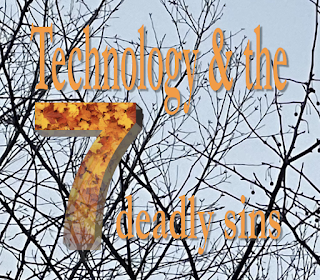 Lust Greed Gluttony Sloth Anger Envy Pride
Lust Greed Gluttony Sloth Anger Envy Pride
March 7, 2021
Technology and the Deadly Sin of Sloth: Part 1
Emily had worked hard to make it to her senior year. majoring in engineering, she was usually hitting the books until late into the evening while her roommate was watching a movie or hanging out with friends. Her hard work paid off: she got good grades, earning a GPA high enough to keep her scholarship. The senior design project course was a final rite of passage, but not for the reasons she first expected. She knew it would require buckling down even more to produce an innovative design that built on what she had learned. She knew that she would expect as much or more from herself as her professors expected. What she did not anticipate was the difficulty of working with a teammate who did not pull their own weight. She had seen Matt in some of her courses, but he didn’t seem to take them seriously enough. Somehow he still passed and made it to his senior year. They were assigned to the same team in the first week of the design course, along with two other students. They all dove into the work and contributed the blood, sweat, and tears that would form a great design. Except Matt. He showed up late to team meetings -- if he showed at all. There was always an excuse, some urgent reason that kept him away or prevented him from getting his part done. What work he did contribute was hurried with little thought or work, and outcomes that were half-baked or painfully wrong, In a word, Matt was lazy. Like Tom Sawyer trying to get the neighborhood gang to paint the fence for him, Matt was always looking for an angle. He was forever seeking that magic shortcut that would get him the result without the effort. Matt repeatedly tried to convince the rest of the team that he was the big idea man, not the worker bee. He would claim his contribution was leadership and vision whose value could not be measured by effort alone. Emily wasn’t buying it. Matt wasn’t leading the team; rather, his idleness was weighing them down.

Merriam-Webster dictionary defines sloth as a “disinclination to action or labor.” Sloth is the sin of laziness. A lazy person does not pull their own weight. They doze off instead of dig in. They lollygag instead of labor. They do not take responsibility for their well-being, hoping others will take care of them. They do not contribute to the team, hoping teammates will cover their deficiencies. A lazy person does not take their turn. A slothful person does not do their fair share.
One form of laziness is procrastination. If our delaying tactics result in avoiding legitimate responsibilities or dutiful work, whether intentional or not, it becomes the sin of sloth. “Sluggards do not plow in season; so at harvest time they look but find nothing.” (Proverbs 20:4) In school, you might have had classmates who postponed studying until the night before the big exam. They would suddenly be in a panic, and the less scrupulous would devise ways to cheat, even asking those that studied to help them in their deceit. At work, you may have participated in a team where someone was constantly late finishing their part of the work. This either diluted the quality of the product or resulted in others having to put in extra time to cover the gaps.
A lazy person sometimes explains their disdain for work by claiming to be looking for shortcuts to be efficient. However, their true motivation is the avoidance of exertion. An addict to the lottery is looking for such a shortcut, hoping that a big payoff will mean they never need to work another day. Investors that get duped into a sure pay-off are similarly gambling under the guise of investment, willfully ignoring that something too good to be true probably isn’t.
At first, it may be difficult to discern whether an engineer seeking a shortcut is optimizing the work or avoiding the work. I understand the drive to optimize. I often catch redundancy because I tend to notice patterns. I spot repetition and rhythm in visual images, poetry, episodes of a television show, and more. When I am writing software and I recognize I am writing something redundant, I tend to refactor my code to make it more efficient, avoiding duplication. When I notice I am repeatedly performing the same complex calculation, I build a script or spreadsheet to compute it for me. The challenge in deciding whether to automate (or not) is to balance the extra cost of creating the automation against the savings in labor. If it takes me an hour to write a script to save a few seconds on a calculation I will only perform a dozen times in total, I have wasted the effort. However, if it saves me minutes of time on thousands of calculations, my side effort has paid off handsomely.
The pursuit of efficiency is a significant driver for technology development. Since efficiency is sometimes the excuse for laziness, it may be worthwhile to consider the connection of technology to the sin of sloth. We often pursue technology as a means of saving labor. A labor-saving instrument enables at least two options that take advantage of the savings: increased leisure or increased productivity. A lumberjack armed with an ax might cut down three trees in an hour, but armed with a chainsaw can cut down three trees in just a few minutes. The lumberjack could now choose to take much longer breaks or to cut down a larger number of trees. If I am that lumberjack, is my purpose and calling to take breaks? Is it to cut down as many trees as possible? Perhaps the labor savings can be used in some wiser manner? Perhaps I can now spend more time considering which trees are the best to cut down this season for the quality of their wood and the overall cultivation of the forest. Perhaps I can now spend more time considering safety for myself and my co-workers when I drop the next tree.
Another form of sloth occurs when we lose sight of priorities, spending an inordinate amount of time on an unimportant activity to the detriment of important work. This muddling of our priorities can happen when we stop paying attention and lose focus. Before we know it, we have spent an hour doom-scrolling through bad news or swiping past Facebook posts -- with no time left for the important task of the day. Muddling priorities can also be a more conscious choice. First, we may choose to misprioritize out of fear, because we have anxiety about the difficulty of the work we should be doing, so we simply avoid it. Second, we may choose to misprioritize for purely selfish reasons, putting ourselves above others, choosing pleasure, power, or other self-indulgences instead of fulfilling our duty.
If sloth is the avoidance of effort and this is sinful, then it seems the effort is something God desires us to pursue. Why? When receiving a gift that is not as lavish as some others, but that was given with sincerity, we sometimes say “It’s the thought that counts.” What we really meant is that the giver intentionally put effort into the gift. It is not solely the thought that counts -- it is the effort. When we strive toward a goal, we are working. Not all goals are good goals. To discern good work for ourselves, we must examine its purpose.
The purpose of workA lazy person will sometimes actually work hard at avoiding work. Mark Twain immortalized this type of laziness in his descriptions of Tom Sawyer scheming to convince other people to whitewash Aunt Polly’s fence, thereby relieving him of the task. Do work and play have a legitimate purpose in day-to-day human life? Or is work a necessary evil to pay for our play? Considering his success at convincing others to whitewash the fence in his place, Tom mused about the nature of work.
Work consists of whatever a body is obliged to do, and that Play consists of whatever a body is not obliged to do. And this would help him to understand why constructing artificial flowers or performing on a tread-mill is work, while rolling ten-pins or climbing Mont Blanc is only amusement. There are wealthy gentlemen in England who drive four-horse passenger-coaches twenty or thirty miles on a daily line, in the summer, because the privilege costs them considerable money; but if they were offered wages for the service, that would turn it into work and then they would resign.
Tom realized that work is in the eye of the beholder. However, Twain lures us into a false dichotomy by contrasting work with play, as if work was drudgery to be avoided and play was enjoyment to be pursued.
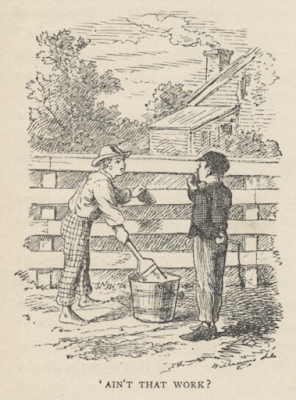 I admit that I sometimes fall into this wrong thinking about work. But this is not the way it is supposed to be. From the beginning, Adam and Eve were given work, even in the perfection of the garden of Eden. Work is not inherently associated with pain. Along with play, work also can give us pleasure.
I admit that I sometimes fall into this wrong thinking about work. But this is not the way it is supposed to be. From the beginning, Adam and Eve were given work, even in the perfection of the garden of Eden. Work is not inherently associated with pain. Along with play, work also can give us pleasure.There is another misleading contrast in the Tom Sawyer mythos that can easily dupe us. We can falsely define work as any task that is forced on us, as any activity that someone else directs us to do. Play is then the tasks we choose to pursue of our own free will. While the boss might assign us tasks that we would not choose ourselves, we do generally have a choice about whether to work for that boss. It is not indentured servitude. Most of us have some choice in our vocation, and this autonomy is a blessing. While we choose to stay on a job, it helps us work through the occasional tasks that are not to our liking. I loved teaching engineering, but I disliked the drudgery of grading. However, it was my choice to teach and I understood the importance of feedback to students, so I did the work.
Modern society paints a certain paradigm of work: the white or blue-collar worker who draws a paycheck for their effort, reports to a boss, and is employed under contract to a corporation. Such a definition is painfully narrow, resulting in a system of worth based on how much one is paid. Work becomes oppressive because we are “working for the man.” Such a definition also results in subtle disrespect of low-paying jobs, careers in non-profit organizations, and a wide spectrum of work that is not paid but is a noble effort towards a purpose. Think of teachers, artists, parents or grandparents caring for young children, adult children caring for elderly parents, and so many other vocations that are valuable out of any proportion to the pay. One blessing of COVID has been the discovery of a new respect for certain types of work. Sure, we already admired front-line workers such as doctors and nurses, and we now appreciate them even more with the pandemic. But we have also learned a new respect for grocery store clerks and delivery drivers. We have gained a new appreciation because of the exposure they risk to supply some of our needs.
If work is not defined simply by drudgery or coercion, then how do we define it? What is its purpose? One could say the first-order purpose of work is to put food on the table. Paul said as much in one of his letters: “The one who is unwilling to work shall not eat.” (2 Thessalonians 3:10) The wisdom literature of the Old Testament tells us this as well: “a sluggard’s appetite is never filled” (Proverbs 13:4) Not only will the lazy person miss a meal, their other basic needs will also go unmet, such as shelter: “through laziness, the rafters sag; because of idle hands, the house leaks.” (Ecclesiastes 10:18) What is the ultimate result of sloth? “The craving of a sluggard will be the death of him, because his hands refuse to work.” (Proverbs 21:25)
We might stop there, defining work to be a means to an end. Work is purely instrumental, a necessary drudgery. Work provides subsistence at least. If there is anything worthwhile beyond that, it is perhaps a means to fund good causes, give to the poor, to fund spreading the good news. However, I suspect there is more to work than merely drawing a paycheck. I believe work also reveals the imago Dei. It demonstrates that we are created in God’s image. We are appointed by God as stewards of his creation, to cultivate and care for it. That is, we are called by God to work. I suspect that work is thus a deeply human characteristic. At its root, work is an intentional effort directed towards a purpose. When we strive toward a goal, whether paid or not, whether physical or mental exertion, we are working. When that goal is aligned with kingdom purposes, when it glorifies God, when it demonstrates love for our neighbor, then that work is itself a sacrifice pleasing and acceptable to God.
Designing technology is work that reflects our Creator and fulfills our role as stewards cultivating the creation. Unfortunately, the choice of which technologies to design and build are driven largely by the ability of customers to pay for the product. This makes sense to a degree, but it tends to make technology a luxury for the wealthy. It takes extra diligence and passion to design for the less well-off in society, e.g., those with physical challenges that need physical aids or the poor who live in areas that lack clean water. If we only design for the wealthy, are we enabling laziness? An argument could be made that someone is going to design it and get paid, so it might as well be me. Yet we could choose to design something nobler, even if the pay is little or naught.
When I first approached writing an article on the deadly sin of sloth, I wondered if I would have much to say. Most engineers I know are not lazy, and I consider myself reasonably diligent. To my surprise, as I started jotting down ideas, it struck me that studying sloth also led me to think about the definition and purpose of work -- and then I had more than would fit in one article! Stay tuned for part 2, where we will explore the purpose of rest, whether technology might make us lazy, and how to seek technological diligence.
This article is part of a series on Technology & the Seven Deadly Sins
 Lust Greed Gluttony Sloth Anger Envy Pride
Lust Greed Gluttony Sloth Anger Envy Pride
February 3, 2021
Technology and the Deadly Sin of Lust
Authors are paying more attention to the sin of lust. While not the most cited, lust comes up third most often in Google’s Ngram (behind anger and pride) and third most often on the Internet Movie Database. In this article, we will define lust, look at some underlying temptations that lead to lust, and focus on how technology can amplify this sin.
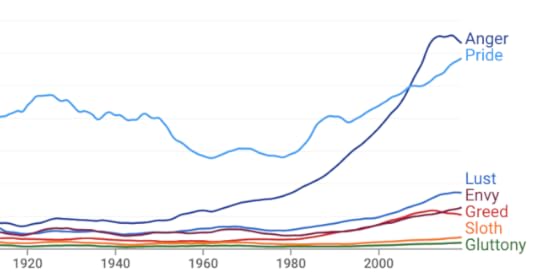 Google Ngram of Seven Deadly Sins
Google Ngram of Seven Deadly Sins
Lust is a strong desire or craving for someone or something. It is a desire so strong that it becomes wrong. It becomes sinful because we do not prioritize our loyalties properly.
The word thirst is sometimes slang for lust, such as the phrase “thirst trap” coined in the last decade to describe selfies posted with the intent to visually attract sexual attention. Thirst, however, is a euphemism that downplays the caustic nature of lust. We would not fault someone for thirst if they were parched with dehydration after exercising. We may even admire someone for thirsting in an abstract sense, such as thirsting for knowledge. Desire by itself is not inherently sinful. For example, we can rightly thirst for water, knowledge, or God. We can appropriately have a lust for life. On the other hand, thirst for violence or drugs is patently sinful. The difference is in the object of the desire.
When I first started working on this article, I thought that the difference might also be in the strength of the desire. However, when I thought about strongly desiring a good thing, it was hard to imagine how this might turn into sin. I came up with two possibilities. First, the desire for a good thing could become a sin if it causes us to adopt the wrong priorities. We might mistakenly put something good above the ultimate good of God, thus idolizing it. We might mistakenly prioritize a benefit to ourselves over the well-being of our neighbor. Desire that becomes lust causes us to no longer prioritize the two great commandments to love God and love our neighbor. A second way that desire for a good thing could become sin might be when another object slips in that is not as noble. If I thirst for knowledge strong enough that it could be called lust, then I suspect that the desire is no longer pure. It is no longer simply knowledge that I want, but also power. When Adam and Eve desired the fruit from the tree of the knowledge of good and evil, they rationalized that the fruit was pleasing to the eye and good to eat. However, they did not solely wish for the satisfaction of their physical hunger. There was something else they began to desire. It became sin because the serpent also tempted them with the desire to be like God. I suspect that strong desire for a good thing may blind us to the sinful lust that slithers in to hide alongside an innocent yearning.
Lust is Unhealthy Sexual Desire
Lust is typically associated with desire of a sexual nature. Is sex what makes desire a sin? Not by itself. God’s original creation was good. He created humans, including their sexual nature, and called them very good. Thus, the object of our desire is inherently admirable.
Scriptures mention sinful lust thirty times. A few times it is used without further clarification. Where some additional context is provided, twelve times it refers to promiscuity and prostitution, four times it refers to adultery. These additional clues help distinguish that desire for sex outside of marriage is the root of the sin of lust.
One might think that this illicit desire is temptation, but not yet sin. Jesus sets us straight, that lust is indeed sin: “But I tell you that anyone who looks at a woman lustfully has already committed adultery with her in his heart.” (Matthew 5:28)
Of all the seven deadly sins, the impact of technology is perhaps most obvious with lust. Although pornography has existed since the earliest technologies of sculpture and painting, during the last century the technologies of photography, magazine printing, and film have amplified this sin with mass marketing. Today’s digital technologies have made it even more prolific through porn web sites. Porn is not the only aspect of technology-enabled lust. We also have dating websites enabling adultery, and private chat services enabling illicit emotional affairs. So-called “thirst trap selfies” are an enticement to lust, and some even make a business out of it with an OnlyFans site promising further titillation for a fee.
One of the remedies for the sin of envy is contentment. So too for lust. Contentment can tame desires that are going into hyperdrive, keeping them balanced so that we keep proper priorities. The apostle Paul writes that “I have learned the secret of being content in any and every situation, whether well fed or hungry, whether living in plenty or in want. I can do all this through him who gives me strength.“ (Philippians 4:12-13) We try to fill the emptiness of our soul with pleasure or power, but it is never enough, our lust remains unsated. It is because our yearning is ultimately for God. That hole of emptiness in our hearts is infinitely deep and can only be filled by God.
All men seek happiness. This is without exception. Whatever different means they employ, they all tend to this end….
And yet, after such a great number of years, no one without faith has reached the point to which all continually look.…while the present never satisfies us, experience dupes us and, from misfortune to misfortune, leads us to death, their eternal crown.
What is it, then, that this desire and this inability proclaim to us, but that there was once in man a true happiness of which there now remain to him only the mark and empty trace, which he in vain tries to fill from all his surroundings? … But these are all inadequate, because the infinite abyss can only be filled by an infinite and immutable object, that is to say, only by God Himself.”
Blaise Pascal, Pensées VII
What Paul and Pascal both realized was that true contentment did not arise from the right circumstances or by satisfying our earthly desires. True contentment only comes from God.
If you want to keep yourself accountable to avoid greed, look at your checkbook, or even share it with a trusted mentor. If you want to keep yourself accountable to avoid lust, look at your browser history. The perceived anonymity of the web emboldens us to look at things we ought not view, but anonymity is an illusion: we are always accountable for our actions.
What if we cannot convince ourselves to be content? What if technology continues to trigger unhealthy desire? Jesus prescribes a radical remedy for temptation: amputation. “If your hand or your foot causes you to stumble, cut it off and throw it away. It is better for you to enter life maimed or crippled than to have two hands or two feet and be thrown into eternal fire.” (Matthew 18:8-9) If you cannot remain content, then remove the temptation. Suppress ads that tempt you. Many social media platforms allow you to mark ads that you don’t want to see anymore. If that is not enough, then remove that app entirely.
Lust is not Solely Unhealthy Sexual DesireThe apostle John distinguishes two kinds of lust: “For everything in the world—the lust of the flesh, the lust of the eyes, and the pride of life—comes not from the Father but from the world.” (1 John 2:16) The first type "of the flesh” refers to sexual sin, but possibly other unbridled bodily desires. For example, the lust for food that goes beyond satisfying hunger to gorging becomes the sin of gluttony. The second type of lust is “of the eyes.” Since it is not bodily desire, then perhaps it is intellectual desire.
Lust need not be sexual in order for it to distract us from that which should remain the object of our desire. Adultery not only occurs with sexual infidelity to one’s spouse but also when emotional affairs divide our loyalties. Following after other gods is likewise dividing our loyalty. Though the Bible most often associates lust with sexual sins, it also mentions lust six times in connection with idols, i.e., an intellectual type of lust. Ezekiel describe idolatrous lust, prophesying that God says “how I have been grieved by their adulterous hearts, which have turned away from me, and by their eyes, which have lusted after their idols.” (Ezekiel 6:9) Today we may not have graven images on our mantle place, but we might lust after power or wealth that takes the place of God for our highest fidelity.
When our desire for something becomes so strong it displaces God from the throne, then it has become the sin of lust. In fact, four of the other deadly sins can be viewed as a type of lust:
Gluttony: Lust for foodEnvy: Lust for possessionsPride: Lust for power and reputation Greed: Lust for moneyTechnology can empower or amplify these types of lust.
This article is part of a series on Technology & the Seven Deadly Sins
 Lust Greed Gluttony Sloth Anger Envy Pride
Lust Greed Gluttony Sloth Anger Envy Pride
November 17, 2020
Technology and the Deadly Sin of Envy
 When did the queen become evil? She had already fallen into sin in the opening paragraphs of the fairy tale recorded by the Brothers Grimm. Before she tricked Snow White into biting the poisoned apple, before she ordered the huntsman to bring Snow White into the woods and kill her, she had already started down the path of evil: she fell into the sin of envy. She envied her young stepdaughter when the magic mirror announced the fairest in the land was no longer the queen, but rather Snow White. Envy was the start of the queen’s malevolence.In this article from my blog series on Technology and the Seven Deadly Sins, I take a look at the sin of envy. Envy is a feeling of discontent because someone else has something better -- better possessions, better looks, better friends, etc. Envy is dissatisfaction with one’s own lot in life when compared to others. Envy often starts out by admiring someone else or simply wanting something better. These are not bad things. Admiration and a desire to improve are good and even noble sentiments.
When did the queen become evil? She had already fallen into sin in the opening paragraphs of the fairy tale recorded by the Brothers Grimm. Before she tricked Snow White into biting the poisoned apple, before she ordered the huntsman to bring Snow White into the woods and kill her, she had already started down the path of evil: she fell into the sin of envy. She envied her young stepdaughter when the magic mirror announced the fairest in the land was no longer the queen, but rather Snow White. Envy was the start of the queen’s malevolence.In this article from my blog series on Technology and the Seven Deadly Sins, I take a look at the sin of envy. Envy is a feeling of discontent because someone else has something better -- better possessions, better looks, better friends, etc. Envy is dissatisfaction with one’s own lot in life when compared to others. Envy often starts out by admiring someone else or simply wanting something better. These are not bad things. Admiration and a desire to improve are good and even noble sentiments.It is not wrong to admire someone else. Admiration is positive appreciation and respect. It may be the appreciation of beauty or respect for skill. However, admiration can devolve into contempt. We start to despise the person we formerly honored. We start to believe that we deserve something as much as they do. Admiration then becomes the sin of envy.
It is also not wrong to want something better for yourself. A homeless person is not wrong to wish for three meals a day. A student aspiring to a professional career is not wrong to wish for a good education, a well-compensated job, or a nice home. The drive and hard work towards self-improvement can be good. However, when that desire becomes self-centered dissatisfaction and discontent, often visible as heavy complaining, that desire becomes sin. Discontent driven from a sense of entitlement causes us to commit the sin of envy in jealousy of others whom we perceive are undeservedly entitled.
How do the noble desires of respectful admiration and sincere self-improvement become corrupted into envy? Envy is subtle. We do not even notice our own envy, and even when we see it, we hardly consider it sin. We can nurse hidden discontentment until it becomes envy, settling in our bones until it rots into bitterness. All the while, people may not notice from the outside. This hidden, subtle sin lies just beneath the surface, robbing us of joy and dislodging our gratitude to God for what we have.
Envy is everywhere. Who is without envy? And most people
Are unaware or unashamed of being envious.
-- T.S. Eliot
We may minimize envy, yet the Bible clearly labels envy and coveting as sins. It is clear in the Old Testament: “You shall not covet your neighbor’s house. You shall not covet your neighbor’s wife, or his male or female servant, his ox or donkey, or anything that belongs to your neighbor.” (Exodus 20:17) It is also clear in the New Testament: “Let us not become conceited, provoking and envying each other.” (Galatians 5:26) “Love is patient, love is kind. It does not envy.” (1 Cor 13:4)
 Envy is often a subtle part of a chain of sins. It can be caused by other sins, such as pride. If we are proud of our abilities or possessions, then we may become envious when someone surpasses us. Envy can take on specific forms. Jealousy is a form of envy, often coupled with a fear of being replaced. Coveting is a form of envy, where the object of our envy is something we could potentially take or steal from our neighbor, rather than an attribute we desire such as strength or beauty. Envy can cause other sins. When we are envious, we often try to tear down the object of our envy through gossip, insults, or worse.Technology-driven Envy
Envy is often a subtle part of a chain of sins. It can be caused by other sins, such as pride. If we are proud of our abilities or possessions, then we may become envious when someone surpasses us. Envy can take on specific forms. Jealousy is a form of envy, often coupled with a fear of being replaced. Coveting is a form of envy, where the object of our envy is something we could potentially take or steal from our neighbor, rather than an attribute we desire such as strength or beauty. Envy can cause other sins. When we are envious, we often try to tear down the object of our envy through gossip, insults, or worse.Technology-driven EnvyIn the modern world, tech gadgets are some of the more obvious of our neighbor’s possessions to covet. Granted, it doesn’t take technological devices to generate envy of our neighbor’s belongings. I might covet my neighbor’s beautiful sculpture or perfect lawn. However, technology is often a driver of envy. One of my neighbors has a bigger TV, another has brighter and more numerous Christmas lights, the next has a faster car. I don’t need to look far to find plenty to tempt me into envy. Even that perfect lawn is the result of technology, as short green grass in perfect uniformity is not naturally occurring, but manufactured from planting cultivated grass seed, applying chemical fertilizers and weed killer, and trimming regularly with a mechanical mower. When we become discontent, whining that the neighbor’s grass is greener or that their Christmas light display is bigger, we have fallen into the sin of envy.
We can also envy someone’s technological skill. Professionals working in technical domains have specialized knowledge. That knowledge represents power, in terms of career, influence, and more. Admiring another’s technical skills can be fine when that admiration produces encouragement toward self-improvement. Where it becomes discontent, admiration turns into envy.
Technology can tempt us into envy due to the frequent upgrade cycle of tech gadgets. Granted, technology is not the only product often marketed as the next “new thing” -- fashion, food, and many other products are often updated to provide a new experience that people flock to purchase. However, technology is inherently an inventive domain that produces the new and unusual as a matter of course. We covet our neighbor’s slightly newer smartphone or TV when ours is only a couple of years or even mere months older. Gadget envy leads to consumerism, materialism, and poor stewardship. We throw out perfectly satisfactory technology that would have lasted many more years, simply to surpass our neighbor.
Technology gives us more neighbors to envy. Due to social media, our neighborhood seems to include not only the couple next door but the brightest pop stars in the world. Today we not only need to keep up with the Joneses but also the Kardashians. Today we not only need to keep up with the other parents at our own child’s school but with the thousands of parents posting idyllic images of their children on Instagram and Facebook. The global crowdsourcing popularity contest of “likes” results in daily encounters with the creme de la creme: the most beautiful, talented, influential, smartest, wealthiest people on the planet. Technology has connected us globally, and thus our discontent can easily find so many more people to envy.
There is another side to that coin of envy. I may inadvertently stoke sin in others by presenting a false version of myself. I may feel pressured to present my best life -- not my real life -- when posting on social media, carefully curating a life story that is seen through rose-colored glasses. I polish my image literally and figuratively to make myself seem better, purer, and more successful. That is not the real me. It is an illusion. I leave out the real-life grit and struggle. I leave out the full picture that admits my foibles and faults. If I was more honest with my friends they would have less to envy, but perhaps more to love.
Scripture clearly warns us about the dangers of envy. Jealousy drives Joseph’s brothers to nearly kill him, but greed overcomes their jealousy at the last moment, selling him into slavery. Jealousy led Cain all the way to murdering Abel. Ahab envied Naboth’s vineyard. When Naboth would not sell it to him, Jezebel hatched a scheme to have him falsely accused and stoned to death. Even King David was guilty of this sin. He coveted the wife of Uriah. David slept with her while Uriah was away at war and Bathsheba became pregnant. David arranged for Uriah to return from the front lines to report on the war’s progress, as a ruse to create an opportunity for Uriah to sleep with his wife, thus obscuring the child’s true paternity. But the ruse did not work. Uriah would not return home in honor of his fellow warriors who remained on the front lines. David then resorted to directing Joab, the commander of his army, to arrange for Uriah to be left exposed during the fighting, so that he was killed.
Scripture also warns us that envy is insatiable. We keep thinking that if only we had this or that, we would be satisfied. The problem is that we will never have enough. The grass is always greener on the other side of the fence simply because it is something we don’t have. Even when we attain something, our wandering eyes fix on yet another thing we don’t have. “Death and Destruction are never satisfied, and neither are human eyes.” (Proverbs 27:20)
Finding ContentmentWhile scripture consistently describes envy, jealousy, and coveting as sinful, it also describes the cure for envy: contentment. For example, Jesus prescribes contentment with one’s salary: “Then some soldiers asked him, “And what should we do?” He replied, “Don’t extort money and don’t accuse people falsely—be content with your pay.” (Luke 3:14) We can be content because God is with us: “Keep your lives free from the love of money and be content with what you have, because God has said, ‘Never will I leave you; never will I forsake you.’” (Hebrews 13:5) Whatever our circumstances, we can find strength and contentment through Christ: “I have learned the secret of being content in any and every situation, whether well fed or hungry, whether living in plenty or in want. I can do all this through him who gives me strength.“ (Philippians 4:12-13) Trusting in God leaves us free from worry and discontent: “The fear of the Lord leads to life; then one rests content, untouched by trouble.” (Proverbs 19:23)
One side note: contentment does not justify laziness. Look at contentment with one’s pay as an example. On the one hand, we should not resort to illicit means of gain, such as cheating, bribery, extortion, or embezzlement. We must work honestly. However, we must also work earnestly. The reason we can be satisfied is that we have worked hard enough to provide for ourselves. “A sluggard’s appetite is never filled, but the desires of the diligent are fully satisfied.” (Proverbs 13:4) Our contentment comes in part because we have labored sufficiently to legitimately enjoy the fruits of that labor.
God’s call for contentment may still seem unrealistic in a world filled with technology and a culture hooked on constant upgrades. When the next gadget comes out with better specs than last year’s model, it can be hard to resist. My wife and I recently purchased new smartphones, though I was definitely more excited than she was about the new and better features. With much of our personal data now on our phones, it took a couple of days before we really had everything in place. Even with much of the data transferred automatically, along with a password manager to easily coordinate the logins that wouldn’t transfer from the old phone to the new, we still had several settings to be adjusted and several apps that had to be reloaded. My wife observed: “This was why I wasn’t in a hurry to upgrade.” She was more content than I was -- at least when it came to our smartphones. We did moderate our consumption a little. Rather than buying each generation of phone as it comes along, we skip some models before upgrading, waiting for significant and substantive improvements rather than minor upgrades and cosmetic updates. Even so, it is easy to fall prey to the upgrade cycle. Most of us could use a little more discernment here.
In closing, recognize that technology shows us more people in the world who appear to be better off in some way, and thus someone to envy. At the same time, technology can also show us the great diversity of humans, so that we realize there are plenty of people just like us and plenty of people less well off than us. Realizing this, we can be grateful for what we have; we can be content.
This article is part of a series on Technology & the Seven Deadly Sins
 Lust Greed Gluttony Sloth Anger Envy Pride
Lust Greed Gluttony Sloth Anger Envy Pride
September 15, 2020
Technology & the Deadly Sin of Anger
Don’t get mad. Get even. In the 1995 film Falling Down, Michael Douglas plays the character of William Foster -- an ordinary guy, your typical shirt & tie professional. However, in the congested, crowded urban jungle of Los Angeles, the setting for this film, Foster becomes frustrated with how the inhabitants of the jungle treat him. Each time he is slighted, he reacts with more aggression than warranted. He removes the obstacles before him using a bat, then automatic weapons, and then a rocket launcher. Although his reactions are cool and calculated, the anger that simmers below the surface is palpable. Getting even, taking revenge, seeking vengeance -- these are not in place of anger. Rather, they are surely driven by it. He does get mad, but it is not clear that he gets even.
Technology is part of almost every obstacle that Foster confronts: urban decay, the congested mass of cars in a traffic jam, the construction zone blocking his path, the armed thugs that try to rob him. At the same time, technology empowers Foster himself to take greater and greater revenge, amplifying his will and his wrath.
In this article from my blog series on Technology and the Seven Deadly Sins, I take a look at the sin of anger, and more specifically, how technology can fan the flames of our wrath. Let’s start by talking about how an emotion can become a sin, then make the connection to technology, and wrap up with some practical tips to avoid this deadly sin.
How Can an Emotion Be a Sin?Anger is an emotion: a strong feeling of irritation, antagonism, displeasure, hostility, and belligerence. Anger is also one of the seven deadly sins. There are also probably more than seven sins and the wages of all of them are deadly. Nevertheless, anger is one of the seven that early Christian thinkers believed were the root of all the others.
How can anger be a sin, if we cannot help how we feel? If we cannot stop an emotion from arising, then how can we be held accountable? While we can’t stop a feeling, we can process it. If we do not manage turbulent emotions, they can grow into gut-wrenching wrath and rage, turning quickly from internal feelings to external, sinful action. When anger turns to action, temptation turns to sin.
Anger may lead to action, but it is not the original cause. Anger itself is a reaction, a secondary emotion. Anger puts us in a self-preservation mode, protecting us from raw fundamental emotions. The primary emotions that drive anger can include:
fear (anxiety, worry, jealousy)sadness (loss, disappointment, discouragement, hurt)shame (embarrassment, guilt, humiliation, rejection, frustration)We use anger to protect ourselves, lashing out to hurt the other person more than they hurt us. Somewhat irrationally, we think that hurting them will stop them from hurting us. Unfortunately, technology often empowers our anger -- and sometimes it induces our wrath in the first place.
Technology Empowers AngerWe sometimes describe someone easily angered by saying that they “fly right off the handle.” Literally, this refers to an ax head that is insufficiently secured to the handle so that mid-swing it is flung back into the air like a slingshot. Presumably, an angry person who loses their cool has lost their head, flown into actions they will later regret, wreaking damage just as a flying ax head might. Isn’t it interesting that we use so many technological metaphors for anger: fly off the handle, let off steam, boil over, blow up, blow a fuse, blow a gasket.

Technology empowering anger is not new. In one of the panes of his painting “The Seven Deadly Sins and the Four Last Things,” Hieronymus Bosch depicted the sin of wrath as two men fighting in a duel, though it appears the fight started with smashing small tables on each other. Furniture, then knives and swords extended their reach to inflict greater damage on the object of their wrath. Even in the middle ages, anger drove irate humans to use the tools at hand to amplify the power of their rage.
When anger turns to action, temptation turns to sin. Active anger puts us in a blind rage, unable to foresee the consequences of our actions clearly, not caring whether we will later regret the damage we do. In this murderous state, we lack judgment and lack mercy. We reach for the nearest tool at hand to inflict maximum damage, bringing to bear overwhelming harm disproportionate to the injury that triggered our anger. We reach for tools because tools make us stronger. If we can hurt someone by swinging a fist, how much more so by swinging a bat. If we can injure by hurling a pan, how much more so by firing a projectile.
You’ve heard that one should use the right tool for the job. The problem is that anger clouds our judgment, so a tool in the hands of an angry person is likely to be used indiscriminately. Tools forged specifically as weapons are not the only technology wrongly used in anger. Technology amplifies our abilities, so any technology might become a weapon in angry hands.
The automobile is one such technology that can become an agent of wrath. This is despite many safeguards. The technology of the car is heavily regulated. We must reach a certain age and must pass a special training course before earning a license to drive. We must know the rules of the road, yet road rage can provoke us into breaking those rules to strike back at the driver that cut us off. The automobile -- intended for individualized mid-range transportation with climate-controlled comfort -- suddenly becomes a two-ton bat that we swing at our adversary, a deadly projectile that we fire their way. In our irrational fury, it matters little that we are sitting inside the very weapon we wield, risking our own lives as well as others.
Anger is empowered not only by physical technology but also by virtual. In the early days of the Internet, a conversation on Usenet newsgroups that escalated into the trading of crude insults was known as a flame war. Today, social media sites like Facebook or Twitter make it all too easy to troll, bully, or post hate speech dripping with venom.
Technology Induces AngerIn our anger, we might reach for technology, but technology can also feed our temper in the first place. Technology has taught us impatience, which leads to anger. Modern electronic technology provides instant responses so that a delay of only seconds can frustrate us. It is not only high-tech smartphones or laptops that induce this lack of patience. The simple cooking technology of the microwave delivers meals in times measured in seconds or minutes at the most. When we are habitually impatient, we are primed to become angry.
Technology has also made it easier to become angry because we empathize less. Long-distance communication dating as far back as the telegraph has also reduced empathy by enabling impersonal interaction and creating psychological distance between us. It is easier to stereotype someone we don’t know well. When we empathize less, we are quick to take offense, becoming angry.
Some technologies make us both impatient and unempathetic. The automobile enabled workers to live further from their jobs, thus making suburbs possible. Today, we cocoon ourselves away from neighbors, no longer knowing them well. Thus empathy is reduced. At the same time, the automobile reduces patience: we can jump in the car and drive immediately to wherever we wish. We no longer count technological convenience as a blessing -- we treat it as a birthright. When our perceived rights are not served, we feel slighted and become angry. Although technology easily empowers and engenders anger, scripture gives us ancient wisdom about cooling one’s temper.
Biblical Wisdom for Modern AngerPride may have been the first sin when Adam and Eve sought to be like God, but the second story of sin we read in Genesis is about anger.
So Cain was very angry, and his face was downcast. Then the Lord said to Cain, “Why are you angry? Why is your face downcast? If you do what is right, will you not be accepted? But if you do not do what is right, sin is crouching at your door; it desires to have you, but you must rule over it. (Genesis 4:5-7)
Cain’s ire is not yet fratricidal sin at this point, but God warns that if he does not exert self-control, anger will take control of him, turning into sin. The New Testament makes this distinction as well: “In your anger do not sin: Do not let the sun go down while you are still angry.” (Ephesians 4:26) The emotion of anger does not start as sin, but if we are not vigilant it becomes sin.
The apostle Paul goes on to tell the church in Ephesus that anger and the like must be eliminated in favor of their opposites: “Get rid of all bitterness, rage and anger, brawling and slander, along with every form of malice. Be kind and compassionate to one another, forgiving each other, just as in Christ God forgave you.” (Ephesians 4:31-32) Anger produces sin, not the fruit that God desires of us: “... human anger does not produce the righteousness that God desires.” (James 1:20). Clearly, the Bible calls us to stop anger before it produces sin -- but that is easier said than done. Let’s now look at some ways we might go about overcoming anger, particularly when technology is involved.
Practical Tips to Turn Aside AngerHow do we prevent the emotion of anger from becoming sinful action? First, take time to understand the underlying sources of anger for yourself. We don’t all get angry for the same reasons, but self-preservation is often our hidden (perhaps even subconscious) purpose. In reality, we are avoiding the raw feelings of fear, sadness, and shame. The world comes at us unexpectedly, hurting us so badly that we react in anger. If we can recognize this cycle before it turns to anger, we may be able to exert some self-control before things get out of hand. “A fool gives full vent to his anger, but a wise man holds it in check.” (Proverbs 29:11) Even so, it is not easy to face fear, sadness, and shame. Our minds would rather ignore that pain and turn it into anger. But there is good news: we need not face them alone. Jesus gives us grace. He takes away our naked shame and dresses us with his own righteousness. Even if fear and shame sometimes are too much for us -- turning to anger and then to sin -- we have forgiveness through Christ’s blood.
Second, while we can prevent anger by understanding the underlying emotions that drive it, we can also prevent it by understanding the physical conditions that trigger it. It is much easier to become angry if stressed. My wife and I have learned that shopping together goes more smoothly if I get a snack mid-way through. Otherwise, I don’t realize that I am getting tired or frustrated. I do not even realize I am hungry yet, but my body is priming me to become “hangry”. Hunger is not the only stressor -- exhaustion can leave us vulnerable as well. We need to take care of our physical needs so that we are better prepared to handle the little bumps in the road of life. Take care of yourself by eating right, sleeping right, taking breaks from long stretches of work, and so forth.
Third, don’t let technology stress you out. You must control it, lest it control you. For all the convenience tech gadgets offer, we often find ourselves busier with technology than without it. For example, we feel time pressure when we over-regulate our lives with time-keeping, planning, and communication technologies. Alarms, to-do lists, calendars, and project planners are all fine technologies when used wisely, but they can also overwhelm you if you use them to assign a task to every waking minute.
Technology can also stress you out due to its distracting nature. Humans are not very good at multitasking, so allowing too many notifications on your phone or computer can be a huge interruption to your workflow, causing eventual stress because you get behind. We can even lose sleep due to this distraction when we peek at our smartphones one more time as we retire for the evening and get drawn into endless emails and Facebook posts.
Fourth, besides stress-inducing tech, we should also avoid tech that empowers too quickly or easily. Much of technology is geared toward instant satisfaction, but it is possible to find technology that provides a slight barrier to unwise actions. For example, the safety lock on a gun prevents unintentional discharge, but also creates a psychological barrier that forces a slight pause before using firearms. Virtual technology can also have a built-in “safety lock”. Some email programs let you set up a small delay between the time you click on the Send button and the time it is actually delivered, allowing you to take it back before you regret it. One can also use so-called tone detector software that will analyze a message and flag text that appears to exhibit a negative or even hostile attitude.
Fifth, back away from anger. Sometimes we fail to notice anger boiling up. A situation catches us unaware until we feel our blood starting to boil and a knot forming in our stomach. “A hot-tempered man stirs up conflict, but a man slow to anger calms strife.” (Proverbs 15:18) Even at this moment when sin is crouching at the door, we can break the cycle and calm down. Take a breath, count to ten, slow yourself down, walk away, or do whatever it takes to de-escalate your rising anger. With practice, you can learn to recognize anger before it gets out of hand.
-----
Unchecked, the emotion of anger becomes deadly sin. Holding on to anger results in hurting yourself emotionally and even physically, as constant bitterness can produce health problems. As Christians, we are called to let go of anger, even if we have been unjustly wronged. We are called to turn the other cheek, to love the perpetrator of that injustice. Let go of your anger and let God take away the anxiety, the hurt, the shame. Trade them in for joy, by the grace of God.
If you are a Christian professional designing new technology, be on the lookout for ways you can creatively enhance your product to prevent use in anger. Include a “safety lock” that helps prevent the careless use of your device. Design a video game that teaches the virtue of patience through the challenges it provides. Enhance a communication technology to help users become more empathetic. In doing so, by the grace of God, you can be the redemptive agent that helps your users trade anger for joy.
This article is part of a series on Technology & the Seven Deadly Sins
 Lust Greed Gluttony Sloth Anger Envy Pride
Lust Greed Gluttony Sloth Anger Envy Pride

